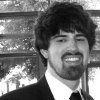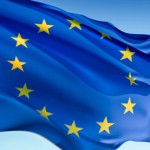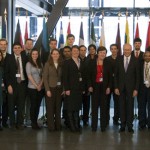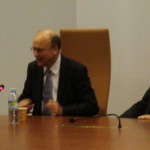Between February 29th and March 7th, a group of 37 American Fulbright Scholars based in Europe participated in a week-long conference on the European Union and NATO held in Luxembourg and Belgium. I was given the opportunity to represent Spain at the seminar, the primary purpose of which was to educate American Fulbright grantees on the structure and functions of European institutions. By exposing grantees to these institutions firsthand, the seminar served to encourage grantees to think about how their future careers might relate to international diplomacy, law, and policy.
Many of the grantees in attendance had formal backgrounds in the social sciences, including economics, international relations, and policy studies. I, however, as a Fulbright researcher studying cancer genetics at the M.D. Anderson Cancer Center in Madrid, was one of a small yet significant group of grantees in attendance who had a background in the natural sciences. While we were in part selected to provide different viewpoints and diversity to the conference, we were also invited so that we would be exposed to contemporary issues in government and international relations outside of the realm of our previous experiences.
Introducing Fulbright scientists to these ideas early on in their careers is essential if we are to encourage their future participation in domestic government or international diplomacy. Unfortunately, America is unique among Western nations in that scientists to a large extent do not participate in government, as recently chronicled by John Paulos in The New York Times and Jeffrey Kluger in Time Magazine [1, 2]. Paulos argues that this trend must be reversed, emphasizing the need for “scientifically literate government leaders who push for evidence-based policies” to improve the national dialogue on topics as diverse as climate change, health care, and economic policy. Exposing grantees to these institutions is also essential to encourage support for scientific programs jointly funded by the United States and the European Union. Indeed, trans-Atlantic collaborations are now essential in my field, epidemiology, where huge, multicenter studies are widely regarded as necessary to answer important questions about human health and disease [3].
I attended the 2012 Fulbright Seminar on the European Union and NATO with the above thoughts in mind. The program, organized by Margaret Nicholson, the Executive Director of the Commission for Educational Exchange in Brussels, provided attendees with a broad overview of law and policy issues in Europe. Over the course of the week, we attended briefings by U.S. State Department officials at the U.S. Embassy in Luxembourg and at the U.S. Mission to the European Union in Brussels. We also visited the European Commission and NATO headquarters, where we were briefed on political, economic, and security issues. In particular, our briefings at NATO highlighted their role in promoting multinational scientific collaborations to improve security and defense. Without a doubt, the highlight of the trip was visiting the European Court of Justice, where we sat in on a live hearing of a case involving airline passengers’ rights followed by a round table on jurisprudence in Europe with Judge Koen Lenaerts [4].
One of the most interesting topics discussed during the week-long seminar was that of the deficit control measures currently being promoted across Europe and their adverse effects on government programs. Chancellor Angela Merkel of Germany has bet her reelection in part on imposing such austerity measures at home and encouraging them in other European Union member states, including Spain [5]. Despite relentless criticism by many outside observers, most notably the Nobel laureate economist Paul Krugman [6], these measures are being implemented across the European continent, and local Spanish scientists are seriously worried that a newly proposed state budget that slashes research expenditures will precipitate the collapse of Spanish science [7, 8, 9].
Overall, this year’s seminar provided attendees with an incredible opportunity to discuss pertinent issues facing Europe and the world, and with a literally physical introduction to the institutions shaping them. I personally benefitted immensely from the seminar, not only by participating in the many discussion sessions that were held, but also by getting to know the other attendees. There is little doubt in my mind that the experience I gained during the conference will positively affect my future career as a physician-scientist.
 Douglas Mata is currently on leave from Rice University and the Baylor College of Medicine in Houston, Texas while undertaking a Fulbright Scholarship at the M.D. Anderson Cancer Center International in Madrid, Spain. He gratefully acknowledges the Spanish Fulbright Commission for financially supporting his attendance at the seminar.
Douglas Mata is currently on leave from Rice University and the Baylor College of Medicine in Houston, Texas while undertaking a Fulbright Scholarship at the M.D. Anderson Cancer Center International in Madrid, Spain. He gratefully acknowledges the Spanish Fulbright Commission for financially supporting his attendance at the seminar.
- Paulos, J.A. Why Don’t Americans Elect Scientists? The New York Times. 13 February 2012.
- Kluger, J. Why Scientists Are Smarter than Politicians. Time Magazine. 28 September 2011.
- Thompson, A. Thinking big: large-scale collaborative research in observational epidemiology. European Journal of Epidemiology. Volume 24, Number 12, 727-731.
- Case C-22/11: Finnair Oyj v Timy Lassooy. European Court of Justice. 1 March 2012.
- Böll, S. et al. Leading By Example: Merkel Bets Austerity Will Result in Re-Election. Der Spiegel. 22 February 2012.
- Krugman, P. What Greece Means. The New York Times. 11 March 2012.
- Confederación de Sociedades Científicas de España, et al. Open Letter for Spanish Science. Investigación Digna. March 2012.
- Moro-Martín, A. Spanish changes are scientific suicide. Nature. Volume 482, Number 277.
- Laursen, L. Funding uncertainty strands Spain’s young scientists. Nature. 6 March 2012.



Un comentario en «Seminar on the European Union and NATO: A Fulbright Grantee’s Perspective»
Hello there, You have done a great job. I will definitely digg it and personally suggest to my friends. I’m confident they’ll be benefited from this website. coach outlet http://www.ticketweb.ca/snl/coach-outlet-online.html
Los comentarios están cerrados.